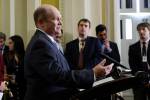Newspapers tell what has happened … and sometimes what will happen
As you can tell by now, I have a penchant for delving into the dusty files of newspaperdom and resurrecting some classic words of wisdom.
In recent years, given the state of the nation and the apparent decline of Federalism as originally outlined by the Founders, I’ve taken to scanning my copy of the Federalist and Antifederalist Papers, which were published in various colonial newspapers in 1787 and 1788.
It was the Antifederalists who managed to persuade a number of state legislatures and a reluctant James Madison to agree to include a Bill of Rights with our new Constitution. It was ratified in June 1788 to replace the Articles of Confederation, but the Bill of Rights weren’t ratified until 1791.
On Nov. 2, 1788, the Maryland Gazette and Baltimore Advertiser published an essay by “An Old Whig,” now known at Antifederalist Paper No. 46, under the title “Where Then is the Restraint?”
In light of the current acts of Congress — which seems to have folded, spindled and mutilated the Ninth and Tenth Amendment in the Bill Rights — this Old Whig’s argument for a Bill of Rights appears to be a futile gesture but a pretty good forecaster of human nature and the lust for power:
Here are a few excerpts from No. 46 with a few parenthetical remarks from me:
“Let us look to the first article of the proposed new constitution, which treats of the legislative powers of Congress; and to the eighth section, which pretends to define those powers. We find here that the Congress in its legislative capacity, shall have the power to lay and collect taxes (far more than the Parliament of England ever tried to do, exponentially), duties, and excises; to borrow money (lots of money); to regulate commerce (down to fuel mileage, speed limits, pharmaceuticals, carbon emissions, lead content, etc., etc.); to fix the rule for naturalization and the laws of bankruptcy; to coin money (lots of it); to punish counterfeiters; to establish post offices and post roads; to secure copy rights to authors (except on the Internet); to constitute tribunals; to define and punish piracies; to declare war (or not); to raise and support armies (or not); to provide and support a navy; to call forth the militia; to organize, arm and discipline the militia; to exercise absolute power over a district ten miles square, independent of all the State legislatures (taking away school vouchers and deciding on gun laws), and to be alike absolute over all forts, magazines, arsenals, dock-yards, and other needful buildings (Yucca Mountain) thereunto belonging. This is a short abstract of the powers given to Congress. These powers are very extensive, but I shall not stay at present to inquire whether these express powers were necessary to be given to Congress? Whether they are too great or too small?
“My object is to consider that undefined, unbounded and immense power which is comprised in the following clause -- "And to make all laws which shall be necessary and proper for carrying into execution the foregoing powers, and all other powers vested by this constitution in the government of the United States; or in any department or offices thereof." Under such a clause as this, can anything be said to be reserved and kept back from Congress? (How well we are learning the answer to that question.) Can it be said that the Congress have no power but what is expressed? "To make all laws which shall be necessary and proper" -- or, in other words, to make all such laws which the Congress shall think necessary and proper -- for who shalt judge for the legislature what is necessary and proper? Who shall set themselves above the sovereign? …
“No one; unless we had a Bill of Rights, to which we might appeal and under which we might contend against any assumption of undue power, and appeal to the judicial branch of the government to protect us by their judgments. (Until the court caves into a president who threatens to pack the court.) This reasoning, I fear, is but too just. …
“Where then is the restraint? How are Congress bound down to the powers expressly given? What is reserved, or can be reserved? Yet even this is not all. … The Congress are therefore vested with the supreme legislative power, without control. In giving such immense, such unlimited powers, was there no necessity of a Bill of Rights, to secure to the people their liberties?
“Is it not evident that we are left wholly dependent on the wisdom and virtue of the men who shall from time to time be the members of Congress? And who shall be able to say seven years (or 200) hence, the members of Congress will be wise and good men, or of the contrary character?”
Contrary characters mostly.























